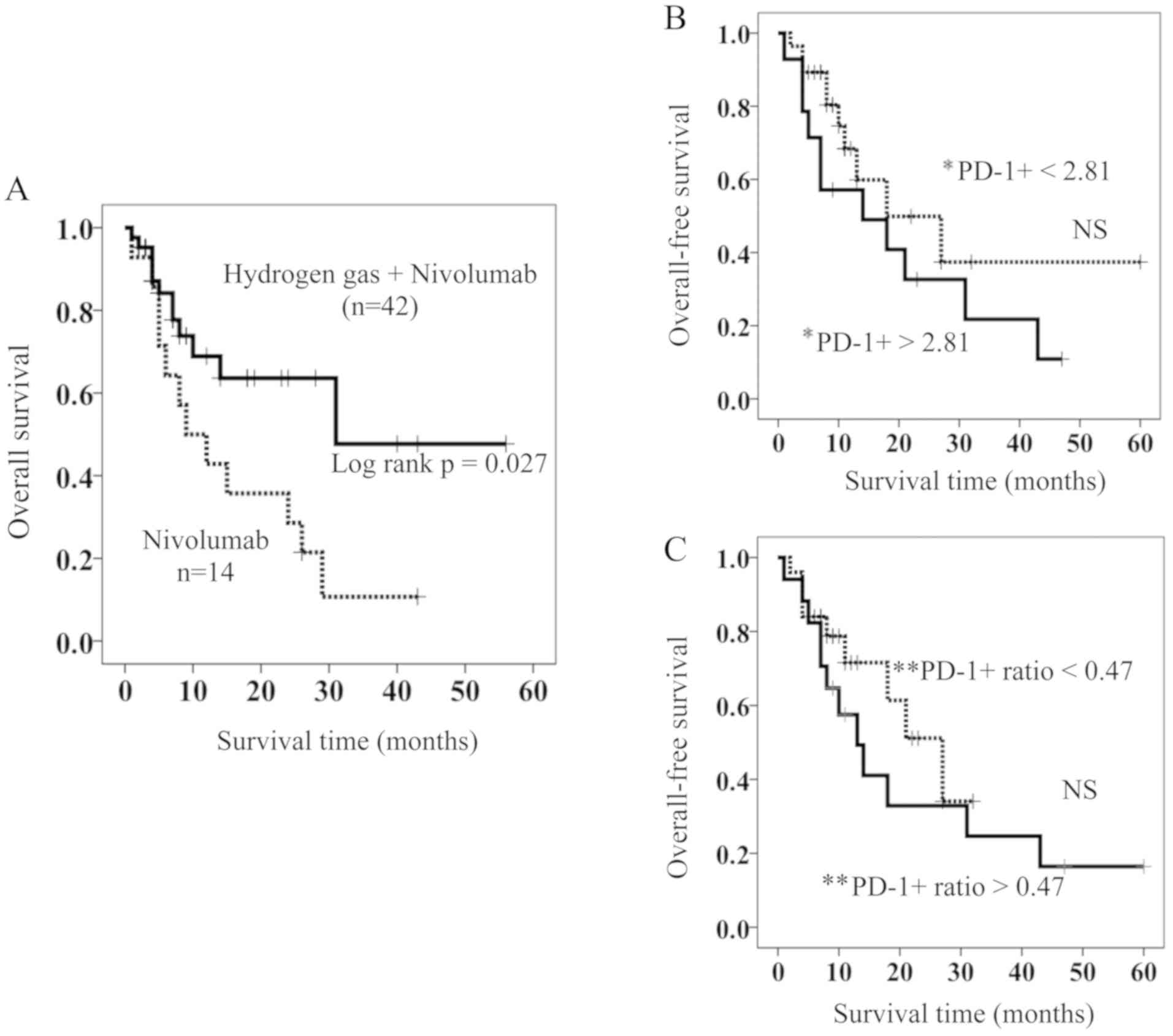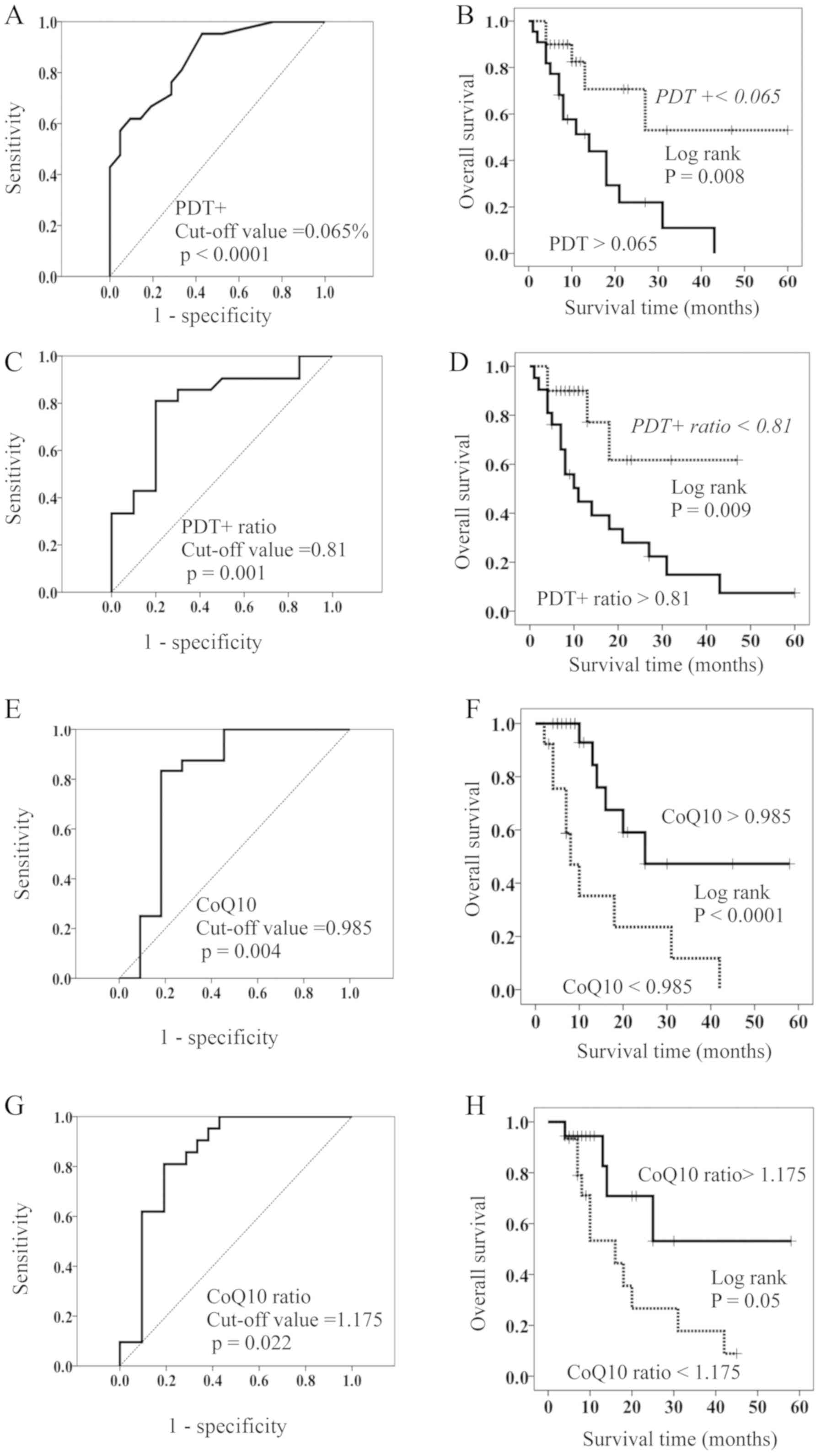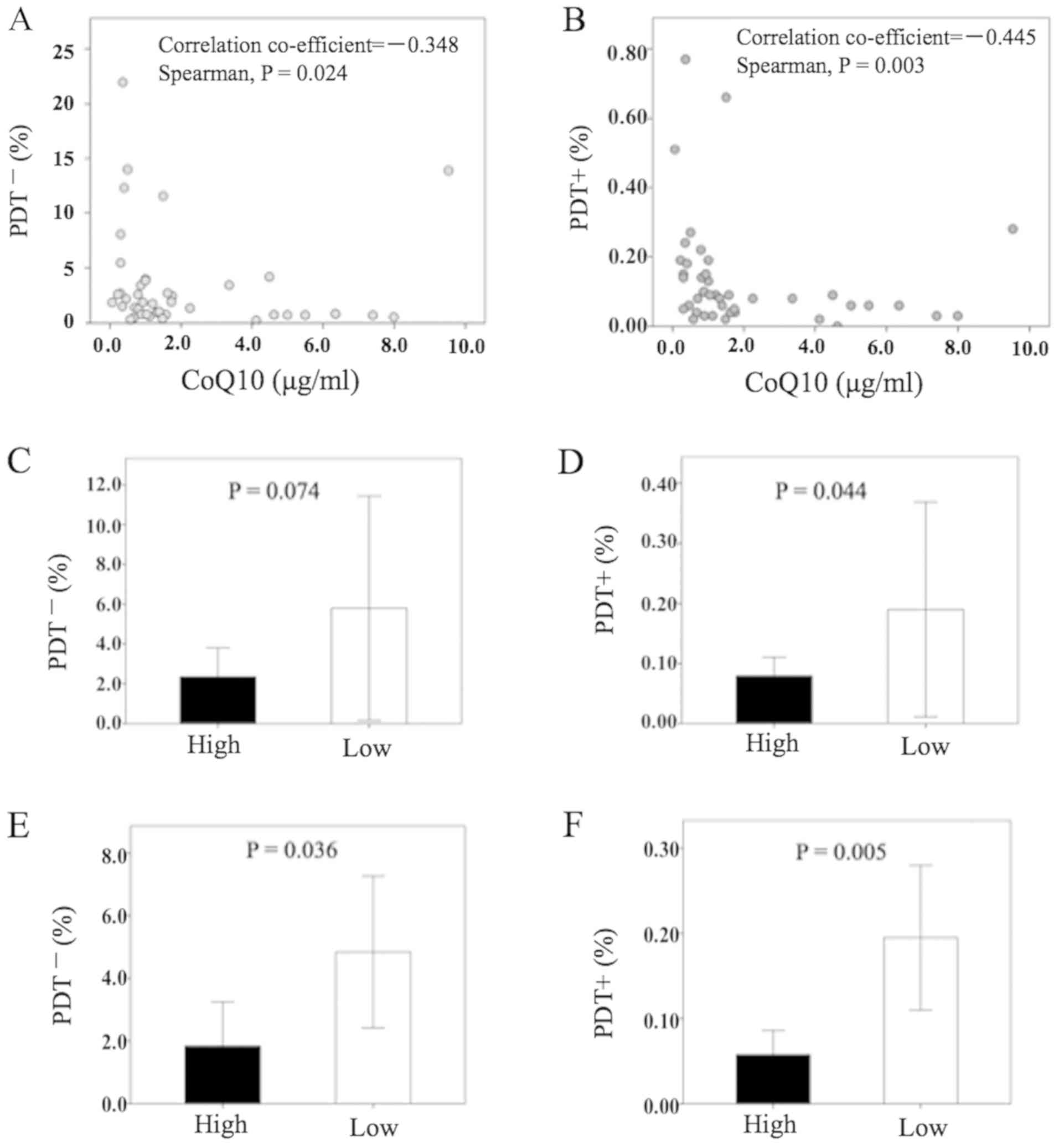|
1
|
Zou W, Wolchok JD and Chen L: PD-L1
(B7-H1) and PD-1 pathway blockade for cancer therapy: Mechanisms,
response biomarkers, and combinations. Sci Transl Med.
8:328rv42016. View Article : Google Scholar : PubMed/NCBI
|
|
2
|
Zajac AJ, Blattman JN, Murali-Krishna K,
Soudive DJ, Suresh M, Altman JD and Ahmed R: Viral immune evasion
due to persistence of activated T cells without effector function.
J Exp Med. 188:2205–2213. 1998. View Article : Google Scholar : PubMed/NCBI
|
|
3
|
Urbani S, Amadei B, Tola D, Massari M,
Schivazappa S, Missale G and Ferrari C: PD-1 expression in acute
hepatitis C virus (HCV) infection is associated with HCV-specific
CD8 exhaustion. J Virol. 80:11398–11403. 2006. View Article : Google Scholar : PubMed/NCBI
|
|
4
|
Fernandez-Marcos PJ and Auwerx J:
Regulation of PGC1-α, a nodal regulation of mitochondrial
biogenesis. Am J Clin Nutr. 93:884S–890S. 2011. View Article : Google Scholar : PubMed/NCBI
|
|
5
|
Scharping NE, Menk AV, Moreci RS,
Whetstone RD, Dadey RE, Watkins SC, Ferris RL and Delgoffe GM: The
tumor microenvironment represses T cell mitochondrial biogenesis to
drive intratumoral T cell metabolic insufficiency and dysfunction.
Immunity. 45:374–388. 2016. View Article : Google Scholar : PubMed/NCBI
|
|
6
|
Chamoto K, Chowdhury PS, Kumar A, Sonomura
K, Matsuda F, Fagarasan S and Honjo T: Mitochondrial activation
chemicals synergize with surface receptor PD-1 blockade for T
cell-dependent antitumor activity. Proc Natl Acad Sci USA.
114:E761–E770. 2017. View Article : Google Scholar : PubMed/NCBI
|
|
7
|
Akagi J and Baba H: Hydrogen gas restores
exhausted CD8+ T cells in patients with advanced colorectal cancer
to improve prognosis. Oncol Rep. 41:301–311. 2019.PubMed/NCBI
|
|
8
|
Lund AW: Re-energizing exhausted T cells?
Sci Transl Med. 8:353ec1352016. View Article : Google Scholar
|
|
9
|
Wang F, He W, Zhou H, Yuan J, Wu K, Xu L
and Chen ZK: The Tim-3 ligand galectin-9 negatively regulates CD8+
alloreactive T cell and prolongs survival of skin graft. Cell
Immunol. 250:68–74. 2007. View Article : Google Scholar : PubMed/NCBI
|
|
10
|
Anderson AC, Anderson DE, Bregoli L,
Hastings WD, Kassam N, Lei C, Chandwaskar R, Karman J, Su EW,
Hirashima M, et al: Promotion of tissue inflammation by the immune
receptor Tim-3 expressed on innate immune cells. Science.
318:1141–1143. 2007. View Article : Google Scholar : PubMed/NCBI
|
|
11
|
Jones RB, Ndhlovu LC, Barbour JD, Sheth
PM, Jha AR, Long BR, Wong JC, Satkunarajah M, Schweneker M, Chapman
JM, et al: Tim-3 expression defines a novel population of
dysfunctional T cells with highly elevated frequencies in
progressive HIV-1 infection. J Exp Med. 205:2763–2779. 2008.
View Article : Google Scholar : PubMed/NCBI
|
|
12
|
Sakuishi K, Apethoh L, Sullivan JM, Biazar
BR, Kuchroo VK and Anderson AC: Targeting Tim-3 and PD-1 pathways
to reverse T cell exhaustion and restore anti-tumor immunity. J Exp
Med. 207:2187–2194. 2011. View Article : Google Scholar
|
|
13
|
Ohsawa I, Ishikawa M, Takahashi K,
Watanabe M, Nishimaki K, Yamagata K, Katsura K, Katayama Y, Asoh S
and Ohta S: Hydrogen acts as a therapeutic antioxidant by
selectively reducing cytotoxic oxygen radicals. Nat Med.
13:688–694. 2007. View
Article : Google Scholar : PubMed/NCBI
|
|
14
|
Kamimura N, Ichimiya H, Luchi K and Ohta
S: Molecular hydrogen stimulates the gene expression of
transcriptional coactivator PGC-1α to enhance fatty acid
metabolism. NPJ Aging Mech Dis. 2:160082016. View Article : Google Scholar : PubMed/NCBI
|
|
15
|
Hosoe K, Kitano M, Kishida H, Kubo H,
Fujii K and Kitahara M: Study on safety and bioavailability of
ubiquinol (Kaneka QH) after single and 4-week multiple oral
administration to healthy volunteers. Regul Toxicol Pharmacol.
47:19–28. 2007. View Article : Google Scholar : PubMed/NCBI
|
|
16
|
Tian G, Sawashita J, Kubo H, Nishio SY,
Hashimoto S, Suzuki N, Yoshimura H, Tsuruoka M, Wang Y, Liu Y, et
al: Ubiquinol-10 supplementation activates mitochondria functions
to decelerate senescence in senescence-accelerated mice. Antioxid
Redox Signal. 20:2606–2620. 2014. View Article : Google Scholar : PubMed/NCBI
|
|
17
|
Gyozdiakova A, Kucharska J, Sumbalova Z,
Nemec M, Chladekova A, Vancova O, Rausová Z, Kubalová M, Kuzmiaková
Z and Mojto V: Platelets mitochondrial function depends on CoQ10
concentration in winter, not in spring season. Gen Physiol Biophys.
38:325–334. 2019. View Article : Google Scholar : PubMed/NCBI
|
|
18
|
Sobin LH and Wittekind CH: UICC TNM
Classification of Malignant Tumors. John Wiley and Sons; New York,
NY: 1997
|
|
19
|
Tamura T, Hayashida K, Sano M, Suzuki M,
Shibusawa T, Yoshizawa J, Kobayashi Y, Suzuki T, Ohta S, Morisaki
H, et al: Feasibility and safety of hydrogen gas inhalation for
post-cardiac arrest syndrome-First-in-Human Pilot Study. Circ J.
80:1870–1873. 2016. View Article : Google Scholar : PubMed/NCBI
|
|
20
|
National Cancer Institute: Cancer therapy
evaluation program, common terminology criteria for adverse events,
v3. Int J Clin Oncol. 9 (Supp III):1–82. 2004.
|
|
21
|
Wang M, Tang W and Zhu YZ: An update on
AMPK in hydrogen sulfide pharmacology. Front Pharmacol. 8:8102017.
View Article : Google Scholar : PubMed/NCBI
|
|
22
|
Chi Q, Wang D, Hu X and Li S and Li S:
Hydrogen sulfide gas exposure induces necroptosis and promotes
inflammation through the MAPK/NF-κB pathway in broiler
spleen. Oxid Med Cell Longev. 2019:80618232019. View Article : Google Scholar : PubMed/NCBI
|
|
23
|
Li S, Fujino M, Ichimaru N, Kurokawa R,
Hirano S, Mou L, Takahara S, Takahara T and Li XK: Molecular
hydrogen protects against ischemia-reperfusion injury in a mouse
fatty liver model via regulating HO-1 and Sirt1 expression. Sci
Rep. 8:140192018. View Article : Google Scholar : PubMed/NCBI
|
|
24
|
Zhang B, Zhao Z, Meng X, Chen H, Fu G and
Xie K: Hydrogen ameliorates oxidative stress via PI3K-Akt signaling
pathway in UVB-induced HaCaT cells. Int J Mol Med. 41:3653–3661.
2018.PubMed/NCBI
|
|
25
|
Crespo J, Sun H, Welling TH, Tian Z and
Zou W: T cell anergy, exhaustion, senescence, and stemness in the
tumor microenvironment. Curr Opin Immunol. 25:214–221. 2013.
View Article : Google Scholar : PubMed/NCBI
|
|
26
|
Callender LA, Carroll EC, Beal RWJ,
Chambers ES, Nourshargh S, Akbar AN and Henson SM: Human
CD8+ EMRA T cells display a senescence-associated
secretory phenotype regulated by p38 MAPK. Aging Cell.
17:e126752018. View Article : Google Scholar
|
|
27
|
Vallejo AN, Weyand CM and Goronzy ZJJ:
T-cell senescence: A culprit of immune abnormalities in chronic
inflammation and persistent infection. Trends Mol Med. 10:119–124.
2004. View Article : Google Scholar : PubMed/NCBI
|
|
28
|
Chappert P and Schwartz RH: Induction of T
cell anergy: Integration of environmental cues and infectious
tolerance. Curr Opin Immunol. 22:552–559. 2010. View Article : Google Scholar : PubMed/NCBI
|
|
29
|
Baitsch L, Fuertes-Marraco SA, Legat A,
Meyer C and Speiser DE: The three main stumbling blocks for
anticancer T cells. Trends Immunol. 33:364–372. 2012. View Article : Google Scholar : PubMed/NCBI
|
|
30
|
Lanna A, Henson SM, Escors D and Akbar AN:
The kinase p38 activated by the metablic regulator AMPK and
scaffold TAB1 drives the senescence of human T cells. Nat Immunol.
15:965–972. 2014. View Article : Google Scholar : PubMed/NCBI
|
|
31
|
Lanna A, Henson M and Akbar A: The
regulation of T cell senescence and metabolism by p38 map kinase
signaling. Innov Aging. 1 (Suppl 1):12542017. View Article : Google Scholar
|
|
32
|
Arthur JS and Ley SC: Mitogen-activated
protein kinases in innate immunity. Nat Rev Immunol. 13:679–692.
2013. View Article : Google Scholar : PubMed/NCBI
|
|
33
|
Zhou J, Yan P, Zhu XD and Yu KJ: Hydrogen
mitigates acute lung injury through upregulation of M2 and
downregulation of M1 macrophage phenotypes. Int J Clin Exp Med.
11:7927–7935. 2018.
|
|
34
|
Li D and Ai Y: Hydrogen saline suppresses
neuronal cell apoptosis and inhibit the p38 mitogen-activated
protein kinase-caspase-3 signaling pathway following cerebral
ischemia-reperfusion injury. Mol Med Rep. 16:5321–5325. 2017.
View Article : Google Scholar : PubMed/NCBI
|

















